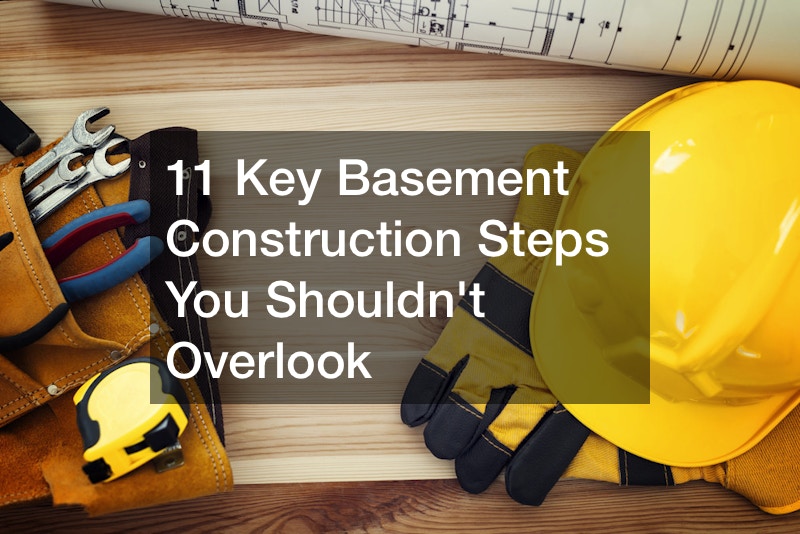

It’s essential to follow accurate basement construction steps before delving in to your project. Not following the right steps can be costly in terms of both time and money. Here are some key basement construction steps you shouldn’t overlook. Consider planning ahead so you don’t miss any of these crucial basement construction steps.
1. Preparing Your Foundation
One of the most important basement construction steps is to prepare your foundation. This includes digging down and leveling the basement area, filling it with gravel, laying footings, and pouring the basement floor and basement walls. Additionally, you’ll want to check for any existing water problems or foundation damage before you start the basement construction process.
If you don’t have a stable foundation, you’ll need to hire a foundation inspection company to assess the basement for any potential damage. These experts will be able to pinpoint any potential issues and provide you with basement construction steps on how to fix them. For instance, they might advise basement waterproofing or basement wall repair.
If you have a foundation but are in desperate need of foundation repair, it’s vital to get a basement construction contractor on board. They’ll be able to quickly diagnose the issue and provide basement construction steps for fixing it. While you might be tempted to simply seal cracks with basement wall sealer, basement foundation repair is a crucial step you can’t overlook.

2. Installing Basement Insulation
Another necessary basement construction step is to install the right insulation. Without proper insulation, your basement will be vulnerable to temperature fluctuations and moisture buildup. You’ll need to choose between two types of insulation — fiberglass or foam board. Fiberglass is a cheaper option but not as effective against humidity. Foam board provides better protection against moisture, however it’s more expensive.
Once you’ve chosen the right insulation, a basement construction contractor can help to install it properly. It’s important to follow the manufacturer’s instructions when installing insulation as this will affect its effectiveness in keeping your basement warm and dry. Fortunately most insulation is incredibly easy to install.
For help, consider hiring a contractor to determine the right insulation. They can inform you of the best R-value, or insulation rating, for your particular basement. With help from a professional, you can be sure that your basement insulation is properly installed and will last for years to come.
3. Waterproofing Your Basement
Getting help from a basement waterproofing company is one of the most critical basement construction steps. Waterproofing your basement will help keep your structure safe from water damage and protect it from mold and mildew. Your waterproofing specialist can survey the area and develop a basement waterproofing plan that’s tailored to your needs.
This might include installing interior drainage systems, exterior coatings, or sump pumps. In addition, waterproofing companies can offer basement wall repair services if needed. Your waterproofing specialist should be able to provide you with step-by-step basement construction steps for waterproofing your basement.
If you live in an area prone to flooding, basement waterproofing is a must. Flood waters can cause serious damage if not properly addressed, so make sure you bring in a professional to assess the area. You might also need permits for certain basement waterproofing techniques, so be sure to check with your local municipality.

4. Choosing Good Flooring Materials
In addition to choosing flooring material for your basement, you’ll also need to install a vapor barrier. This will help keep moisture from seeping into the flooring and damaging it. Many types of flooring, such as vinyl or laminate, come with a vapor barrier already built-in. If you’re installing carpeting, for example, you’ll need to install additional plastic sheeting as a vapor barrier.
Your basement construction contractor can help you select the right flooring material for your needs and provide instructions on how to install it correctly. Regardless of the flooring material you choose, make sure that it’s rated for basement use and provides adequate protection against moisture. For instance, some flooring contractors might recommend ceramic tile as a moisture-resistant option.
Once you choose the right materials, shopping for the best prices on the flooring and installation is important. Consider looking for flooring liquidators or samples and compare prices from different companies. Taking the time to research and shop around can help you save money and get the best value for your basement construction project.
5. Installing Plumbing
Plumbing contractors are the best option for installing plumbing in your basement. They have the necessary experience and knowledge to install everything correctly. This will help guard against possible problems in the future. A professional plumber can also provide you with advice on how to save money when it comes to plumbing materials and installation.
Make sure to choose a contractor with plenty of experience in basement construction. Ask for references and make sure they have an up-to-date licence before you hire them. Additionally, look into any warranties they provide on their work so that you can be sure your plumbing will stay in great shape for years to come.
A good local plumbing can provide warranties for new plumbing systems, toilet installation, and other services. They also usually provide annual maintenance, helping to keep your plumbing system in good condition. Consider asking your contractor if they provide any discounts or offers that you can take advantage of. In any case, don’t skimp on quality when it comes to plumbing materials and installation.
6. Choosing The Right Window and Window Treatment
Your windows can make or break the look of your basement. Finding the right style and size can be a challenge, so it’s important to choose wisely. Choosing the best windows is one of the most important basement construction steps. You’ll want to make sure the window fits properly and doesn’t let in drafts or leaks.
Install windows with a double-pane design to help keep cold air out in the winter and provide extra insulation. Additionally, make sure to choose window treatments that will help keep your basement warm and comfortable during the colder seasons. Shutters, blinds, and curtains are all good options.
Finally, make sure to maintain your windows regularly to keep them looking good and functioning properly. Clean the windows with a gentle glass cleaner and use weatherstripping if needed. Proper window maintenance will help you get the most out of your windows and keep them in good condition for a long time.

7. Ensure Proper Ventilation
If you plan on spending time in your basement, ventilation and air quality are essential. Poorly ventilated basements can be uncomfortable to stay in for extended periods of time and can also affect your health. Ensure that you have adequate ventilation throughout the basement to keep air circulating and fresh.
Make sure there are no drafts in the basement and install an air circulation system if needed. Also, consider installing a humidity control system to keep the air quality comfortable. This will help reduce the potential for mold formation and mildew buildup. For people that plan on using the basement as a sauna room or gym, installing a dehumidifier is also recommended.
For help ventilating and improving the air quality in your basement, contact a local HVAC contractor. They can discuss what you need to do to improve the air circulation and make sure that your basement is a safe and comfortable place to stay. You can also use natural ventilation by installing exhaust fans and opening windows when possible.
8. Hooking Up Electricity
One of the most critical basement construction steps to not ignore is lighting installation. Your basement should have good lighting throughout so that it is easy to use and navigate. Installing the right type of light fixtures can help create a great atmosphere and make your basement a space that you can enjoy.
When it comes to electricity, make sure to get the help of an electrician. They will be able to ensure that all wiring is done correctly and safely. Additionally, they can give you advice on the best type of light fixtures to use in your basement, as well as how to save energy. For instance, LED lights are a great option for basements since they use less energy and last longer.
Finally, make sure to test all lights and outlets before finishing the project. This will help ensure your safety and allow you to enjoy your newly renovated basement with peace of mind. You can also opt for home automated lighting systems, which can be a great option for convenience and energy savings.

9. Adding Personalized Features
You’ll want to hire a custom construction service to add personalized features in your basement. Things like built-in shelving, cabinets, and custom lighting can create a unique look that you won’t find in any other basement. If you’re looking for more luxury and comfort, consider adding a sauna or Jacuzzi to your basement. However, if you opt for this route, keep in mind ventilation and electricity needs.
Adding a custom bar can also be a great way to entertain friends and family in your basement. A wet bar with a tap, refrigerator, and other features can create a great hangout space that everyone will love. Additionally, installing a media room with a home theater system is another way to enjoy your basement.
Whichever additional features you’d like, one of the most important basement construction steps is to make sure your personalized features are done safely and correctly. Hire an experienced custom construction service to make sure everything is done properly. Also, shop for different materials and fixtures that will make your basement stand out.
10. Inspecting For Moisture
One of the most important aspects of basement construction is ensuring that it does not accumulate moisture. Moisture can lead to the growth of mold and mildew, which can be harmful. Before you begin any construction on your basement, inspect for existing moisture and consider having it professionally tested if needed.
Once you’ve identified the sources of moisture, make sure to use waterproofing materials and take preventive measures to keep your basement dry. This includes installing a sump pump and drainage system, sealing any cracks in the walls or windows, and using breathable materials like insulation and drywall. Additionally, make sure to keep your gutters and downspouts clean to avoid any water leaking into your basement.
When it comes to moisture, don’t overlook the importance of inspecting your basement. Making sure that it is dry and sealed will help ensure the success of your construction project. These are just a few of the key basement construction steps you should not overlook. With proper planning, you can rest assured your basement will stay free of moisture, mold, and won’t deteriorate over time.
11. Exterminating Pests
Pests are common in basements, as they provide warmth and a place to hide. To ensure your basement is pest-free, make sure to hire an exterminator before starting the construction process. They’ll be able to inspect your basement for any existing pests and identify where they may be coming from. Additionally, they can give you advice on how to keep pests away in the future.
Some signs that you may have pests in your basement are droppings, gnaw marks on wood, and other damage. If caught early enough, this can help prevent any further damage to your basement and the rest of your home. By hiring a professional exterminator, you can make sure that you don’t have any unwanted visitors in your basement.
Once the extermination process is complete, make sure to fill any cracks or gaps with caulk or foam sealant. This will help prevent pests from getting inside again and causing further damage. In addition, you’ll want to use pest-proof insulation and seal any windows or vents. Following these steps will help keep your basement safe from unwanted visitors.
These are just some of the key basement construction steps that you should take into consideration when renovating your basement space. With proper planning and attention to detail, you can create a safe, comfortable, and stylish basement that you can enjoy for years to come.


